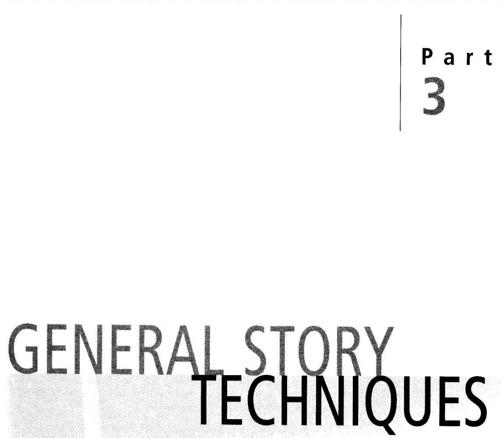Writing the Breakout Novel Workbook (31 page)
Read Writing the Breakout Novel Workbook Online
Authors: Donald Maass

Conclusion:
Go back to your favorite novels. Read them with an eye for tension. You will find that your favorite novelists always—
always
—have tension on the page. Tension, in some form or another, on every page is the secret of great storytelling.

First Lines/Last Lines
N
o doubt about it, a great first line pulls us immediately into a story. It hooks. It intrigues. It opens a world in which things already are happening, in which discoveries await. Or it can. Sadly, many first lines lie flat on the page doing nothing helpful at all, merely setting a scene or in some other way getting ready for story rather than telling it. Weak first lines greet us like a limp handshake.
What makes first lines effective? Let's try out a few. Listed below are some first lines from recent novels, followed by a rating scale. Read each one and then rate (five being the best) how interested you are in reading the line in the novel that will follow it.
1. I searched for sleep curled up in my quilt—the one made for me at my birth by my paternal grandmother's own hands.
1 2 3 4 5
2.
If half of all marriages end in divorce, how long does the average marriage last?
1 2 3 4 5
3.
Mike always teased me about my memory, about how I could go back years and years to what people were wearing on a given occasion, right down to their jewelry or shoes.
1 2 3 4 5
4.
When my father finally died, he left the Redskins tickets to my brother, the house on Shepard Street to my sister, and the house on the Vineyard to me.
1 2 3 4 5
5.
When the lights went off the accompanist kissed her.
1 2 3 4 5
6.
Upon waking this cold, gray morning from a troubled sleep, I realized for the hundredth time, but this time with deep conviction, that my words and behavior towards you were disrespectful, and rude and selfish as well.
1 2 3 4 5
7.
Tal stretched out his hand and pulled himself up onto the next out-thrust spike of the Tower.
1 2 3 4 5
8.
I was never so frightened as I am now.
1 2 3 4 5
9.
Watch your step.
1 2 3 4 5
10. In the fleeting seconds of final memory, the image that will become Burma is the sun and a woman's parasol.
1 2 3 4 5
11. Through my binoculars, I could see this nice forty-something-foot cabin cruiser anchored a few hundred yards offshore.
1 2 3 4 5
12. He plunked two ice cubes into the glass and submerged them with Johnny Walker Black.
1 2 3 4 5
1. Sullivan's Island
by Dorothea Benton Frank
2.
The Saving Graces
by Patricia Gaffney
3.
The Dive from Clausen's Pier
by Ann Packer
4.
The Emperor of Ocean Park
by Stephen J. Carter
5.
Bel Canto
by Ann Patchett
6.
Cloudsplitter
by Russell Banks
7.
The Seventh Tower: The Fall
by Garth Nix
8.
Affinity
by Sarah Waters
9.
The Crimson Petal and the White
by Michel Faber
10. The Piano Tuner
by Daniel Mason
11. Plum Island
by Nelson DeMille
12. Jitter Joint
by Howard Swindle
Which of these first lines worked for you, which didn't, and why? All are taken from successful novels, some huge best sellers, and yet not all of them lead to the next line as effectively as others.
All, however, have their points. Some speak in a narrative voice that engages, talking to us directly as if we are already listening (1, 3, 6). Others have buried in them a little question that is begging to be answered, that makes us wonder,
What does that mean?
(2, 4, 10) Others present a physical situation that is in some way vivid or arresting (5, 7, 8, 9, 10, 11).
Notice that none but one (12) tries to set a mood with flat description. Mood setting is a weak way to go, though this opening to
Jitter Joint
makes sense once you realize that the protagonist is an alcoholic and the plot concerns a murder in a rehab clinic.
However you rated the effectiveness of the first lines cited, each in some way leads us into the world of the novel. Each has a little mystery or intrigue that makes us want to know more. For instance, in
The Emperor of Ocean Park
(4), why did Talcott Garland's father carve up his estate in that particular way? Was the division fair? Does Garland think so?
In that simple but striking opening to
Affinity
(8), what is Margaret Prior afraid of? When soprano Roxanne Coss is kissed by her accompanist in the opening moment of
Bel Canto
(5), what happens next? Is the kiss welcome? Even a detail that is a bit out of the ordinary, such as the spikes "out-thrust" from the Red Tower in
The Seventh Tower: The Fall
(7), can set us wondering why this place is different.
There are many ways to describe this effect, but I call it the intrigue factor. It is the element that makes us wonder—"What does that mean?" or "What happens next?"—and therefore leads us to the next line where we may find the answer.
All this happens so fast that we are unaware of it. In the few seconds it takes to read an opening line, our subconscious minds already are racing ahead. Without us being aware of it, our eyes jump eagerly to the second line. Will that line tell us what we need to know? If not, maybe the third line will.
And so it goes. We are hooked.
Just as surely as an intriguing first line can draw readers into a novel, a stunning exit sentence can propel a reader onward in wonder—wondering, perhaps, when your next novel will be out.
Earlier I discussed the sixth book in Laurel K. Hamilton's series about vampire hunter Anita Blake,
Blue Moon.
Anita, a committed Christian, is deeply unsettled about her work, especially the increasing ease with which she kills. In
Blue Moon
she breaks her own boundaries in still more ways, including sexually and magically. When she finally has rescued the world from the demon that is behind the evil in small town Myerton, Tennessee, Anita absents herself from her home city, St. Louis, for a time to reflect on the changes she has undergone and the remorse she feels.
The last paragraph of
Blue Moon
sums up the irresolvable difference between what Anita Blake is and what she would like to be:
I faced a demon with my faith and prayer. Does that mean God has forgiven me my sins? I don't know. If He has forgiven me, He's more generous than I am.
Do you see the point, here? Anita's story is not over. There is unfinished business, even if it is only the business of forgiving herself. Hamilton's last line opens doors rather than closing them. I, for one, will be reading the next novel in the series to find out what happens next. So, I suspect, will many others.
This same forward-looking quality can be found in the last lines of Kris Nelscott's Edgar Award-nominated first mystery novel,
A Dangerous Road,
the story of a black Beale Street detective, Smokey Dalton. The novel is set in Memphis in February, 1968, the time of a sanitation workers' strike, riots, and the assassination of Smokey's childhood friend Martin Luther King Jr. As the Civil Rights movement marches toward a bloody turning point, Smokey is hired by an alluring white woman from up North, Laura Hathaway, who hires him to investigate a puzzling question: Why has her mother generously remembered Smokey himself in her will?
Smokey's investigation leads him down a dangerous road indeed, to an explanation of how he and Laura are linked and the reason why his parents were lynched. The novel ends with Smokey on the run with a little boy, Jimmy, who saw King's assassination and can identify the man who shot the civil rights leader (and it is definitely
not
James Earl Ray).
Smokey's world has been torn apart by his love affair with Laura, the secrets he has uncovered and the death of his friend. Jimmy represents truth, innocence, witness to the past, and hope for the future. Smokey is determined to safeguard him, to find a place to make a new start. In the novel's closing paragraphs, Nelscott leaves Smokey grapping with the changes that have overcome him—and America—as he and Jimmy run:
Because once again, my life has changed overnight. If I have learned anything, it is that nothing goes as I plan. I need to adjust, to move, to allow myself to go with whatever happens, however it happens.
I wish I had done that more with Laura.
I think of her sometimes, usually at sunrise, when the light is so golden that it makes the land seem brighter than it can ever be. And, despite myself, I find hope in that light.
It is as Martin said on the last night of his tife. Only a man who has seen the darkest night can appreciate the light.
I am just beginning to appreciate it. And for the first time, I am turning toward it, believing it will lead me home.
Admittedly, Hamilton and Nelscott are writing series, so it is perhaps easier for them to write open-ended last lines than for some others. With stand-alone novels, a last line signals the close of the story. It is the final note of resolution and release, and so a touch of lyricism is called for.
Lisa Wingate's warm and life-affirming literary novel,
Tending Roses,
tells the story of suburban achiever Kate Bowman, who travels with her husband, Ben, and infant son to the family farm in Missouri to face the task of convincing her frail and memory-impaired grandmother to enter a nursing home. It turns out Kate and Ben have bigger problems than Kate's grandmother, though, and it is through reading her grandmother's journal, an account of simpler times, that Kate discovers the secrets of a happy life.
At the end of the novel (get out your hankies) Kate's grandmother dies. Kate, newly pregnant, goes to her grandmother's grave to tend the roses growing there. There in the graveyard at dusk, Kate at last savors the peace and joy in life that she has received from her grandmother's life:
The light around me dimmed slowly as another day surrendered its grasp on the land. On the hillside, the roses nodded on the breeze, as if inviting the fireflies to come out and dance.
Such a pretty line! Wingate captures a feeling of closure, of peace, of ending, and of beginning all at the same time. The surrender is not the day's, but Kate's; it is a surrender to life itself.
Have you yet reached the last line of your current novel? If you have, go back. If you haven't, pause when you get there. Take the time to get your last line just right. Whether its leads forward or lifts our spirits or softly closes a door, make it a line we will remember—especially when we see your next novel on the bookstore shelves.
________EXERCISE
Enhancing First and Last Lines
Step 1: What is the intrigue factor in your opening line? What question does it pose, or what puzzle does it present? |
 |